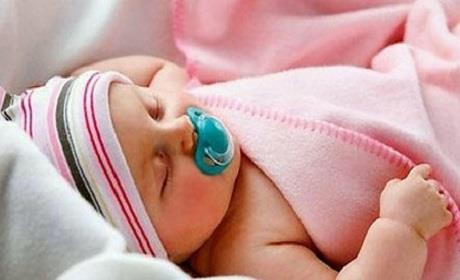Parents often use pacifiers for children, and learn about the notes when letting children use pacifiers.
3. Basic principles when using a pacifier
If you decide to give a pacifier to your baby, remember to keep these rules:
Let your child guide your decisions. If your baby seems to like pacifiers then great. But if your child doesn't like it, don't force them to use them. You can try again at a different time or respect the child's preferences and don't force them to use it.
In any case, do not use a pacifier to delay feeding or to replace your attention. Have your baby use a pacifier between meals when he is not hungry.
Also, do not immerse the pacifier in juice or sugar water as this can lead to tooth decay.
You can try giving your baby a pacifier before a nap, but if it falls out of the mouth while the baby is sleeping, don't put the nipple back in the mouth. When your child fussy and cries, try to comfort him in other ways, such as cuddling, lulling, or singing.
However, in some cases, it is imperative that your child wait for you to feed or comfort you, as if you were paying for a supermarket bill, it is perfectly reasonable to use a pacifier.
Never tie a nipple to a baby's neck or crib as this can cause choking. The safest method is to attach a pacifier to your baby's clothing with a special clip.
Choose a pacifier that is safe and suitable for your baby and keep it clean by rinsing it with warm water, replacing it as soon as you see minor cracks or signs of wear.
4. When should a child not use a pacifier?
Do not let a child use a pacifier when he or she has weight problems. If your baby is having trouble breastfeeding or if you are having trouble keeping your baby's milk supply, it's best to stop using a pacifier right away. In addition, you must also consider not giving your child a pacifier if he or she has had many ear infections.
In the case of a baby who is premature and underweight like other babies, the use of a pacifier is not the main factor preventing the baby from gaining weight, but it can also protect the baby from SIDS, so consult See your doctor before you decide.

A pacifier can be used for a short nap
5. Use a pacifier to affect the baby's teeth development?
Attaching a pacifier in the early years of life can affect a baby's oral development, but not many babies use a pacifier long enough to lead to these harms.
During the period of using a pacifier, the baby has only baby teeth, and permanent teeth usually begin to grow when the baby is 6 years old. If you are concerned about this, ask your doctor or dentist to check your child's jaws and teeth.












